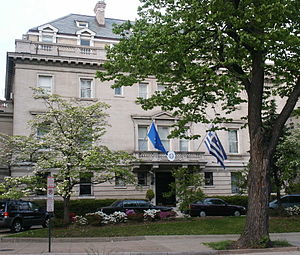|
|
| Embassy of Greece in the US, (Photo credit: Wikipedia) |
Christos Panagopoulos is ambassador of Greece to the United States.
(
GREEK AMERICAN NEWS AGENCY) - Although I just arrived in Washington, D.C., as the new Greek ambassador, America makes me feel right at home. This is not only because I have served in the United States twice in my career ― in Boston and in Los Angeles ― but also because there are so many things here that remind me of my home country’s heritage and radiant culture, bringing out the deep affinities of our two nations, our shared values and our strong ties of friendship and alliance.
The Capitol building, with its neoclassical architecture, the themes of the Federalist Papers and the works of the Founding Fathers of America ― all can find many of their roots in Hellenism. The Hellenic spirit has always transcended its geographic borders ― not just in antiquity, but through the Hellenistic era, the Byzantine Empire, the Age of Enlightenment and onwards.
Our destinies have always been intertwined, from the admiration of the Greek people for this nation’s own struggle for independence to the American people’s support for our War of Independence, and the solidarity to the outnumbered Greek Army’s stand against the Axis forces, which resulted in the first Allied victory in WWII. We have fought side by side throughout all the major conflicts in the 20th century, and your famed Liberty ships launched the modern Greek shipping industry. Our mutual history is also linked by the long presence of the Greek American community: a community that came to America in times of hardship and has managed to thrive and excel through hard work, commitment and dedication to their new homeland.
My arrival in America coincides with Greece’s severe economic crisis and our efforts to implement long-overdue reform. This has deeply affected the Greek people: it has led to a dramatic drop in their standard of living, which was never nearly as high as that in other Western European nations.
We are indeed grateful for the support of our European partners, the U.S. and the international community. This support is not free: it comes in the form of loans that we are paying back with interest; it comes at a cost to everyday people, as we are pushing through painful reforms; and it comes as a response to a crisis that is not just Greek or even just European.
To paraphrase John Donne, “No economy is an island.” In this global economy, our fates are intertwined. However, Greece offers the West an island of stability in a volatile and crisis-stricken region. Understanding this, we take our responsibilities very seriously, implementing drastic measures that no other modern country has taken in such a short period of time. We are also making great strides in an ambitious privatization plan, and doing a great deal to attract foreign investment.
Fiscal crisis aside, Greece is a country of many treasures: its sun-kissed beauty, its rich history and culture, and its Mediterranean climate that yields agricultural products of exquisite quality make it unique. Greece offers well developed tourism, shipping, and service industries; a highly skilled and hard-working labor force; natural resources; and above all, the perpetual will of its people to succeed.
Despite the crisis at hand, Greece is proactively pursuing its foreign policy objectives. Focusing on our region, we are striving to bring the countries of Southeast Europe into the Euro-Atlantic family, on the condition that they meet the necessary criteria and respect the principle of good neighborly relations. Just a few days ago, the Turkish foreign minister visited Athens. We still have pending issues, but we maintain close and regular consultations, trying to find common ground. Also, the Albanian foreign minister paid a visit, after we signed, along with Italy, a Memorandum of Understanding (MOU) for the construction of the Trans Adriatic Pipeline (TAP), to promote energy security in Europe. We have proposed to the former Yugoslav Republic of Macedonia that we sign an MOU to facilitate the resolution of the name issue, trying to break the deadlock caused by Skopje’s lack of any constructive step since the U.N. talks began almost 20 years ago.
In the swiftly changing region of the Middle East and North Africa, we maintain close contacts with the countries in democratic transition, including Egypt, and we are closely monitoring the deteriorating situation in Syria. We are enhancing our cooperation with Israel, to the benefit of stability in the wider Eastern Mediterranean.
Greece has a proven record as a steady and reliable ally that provides critical support to NATO. For example, Greece is taking part in the operation in Afghanistan and provided vital logistical support to the operation in Libya. In the true spirit of cooperation, we are committed to working with you to promote peace and stability, remembering that both countries have given the world democracy, freedom and the inherent value of the individual. I look forward to our future together.








